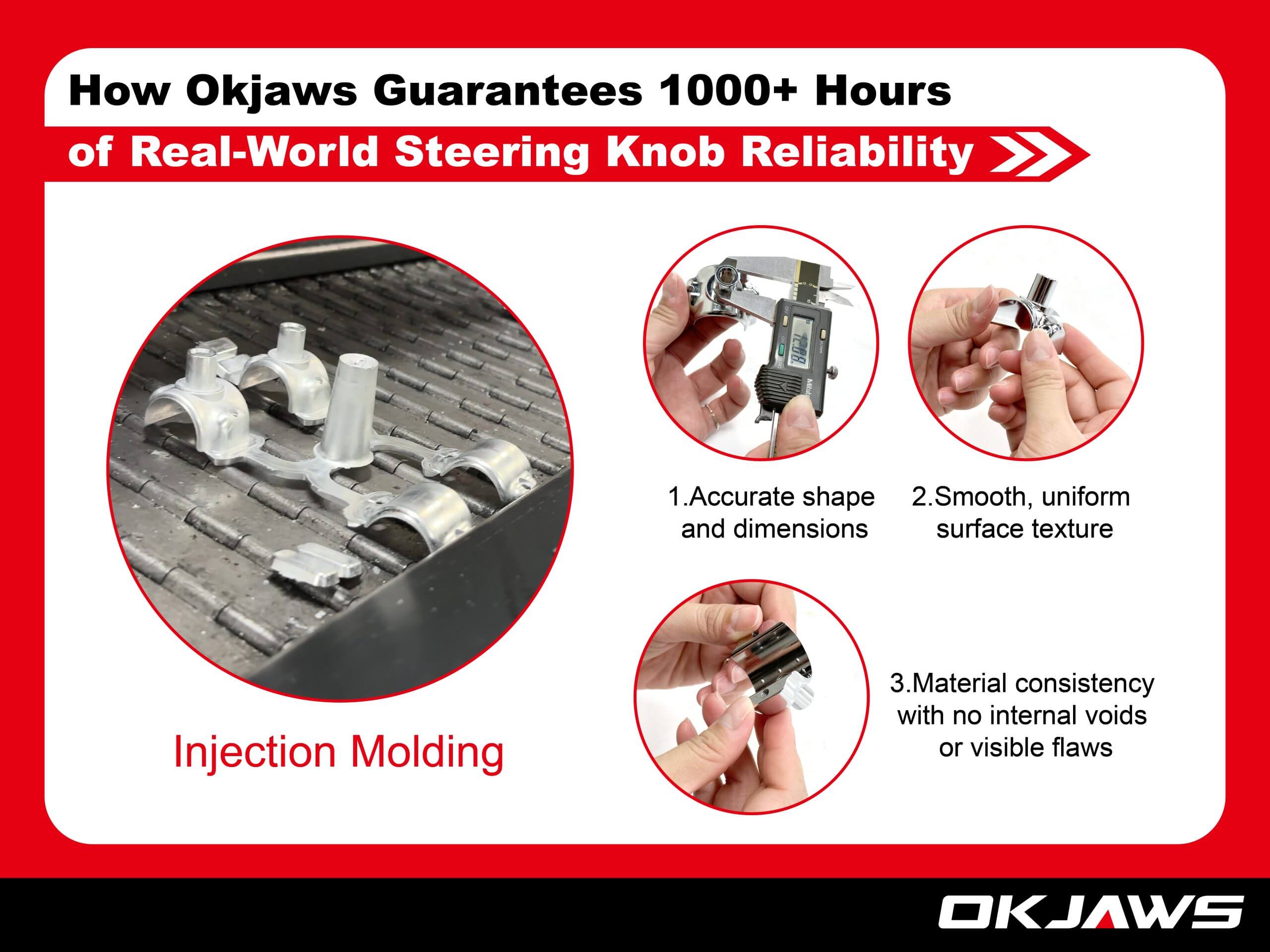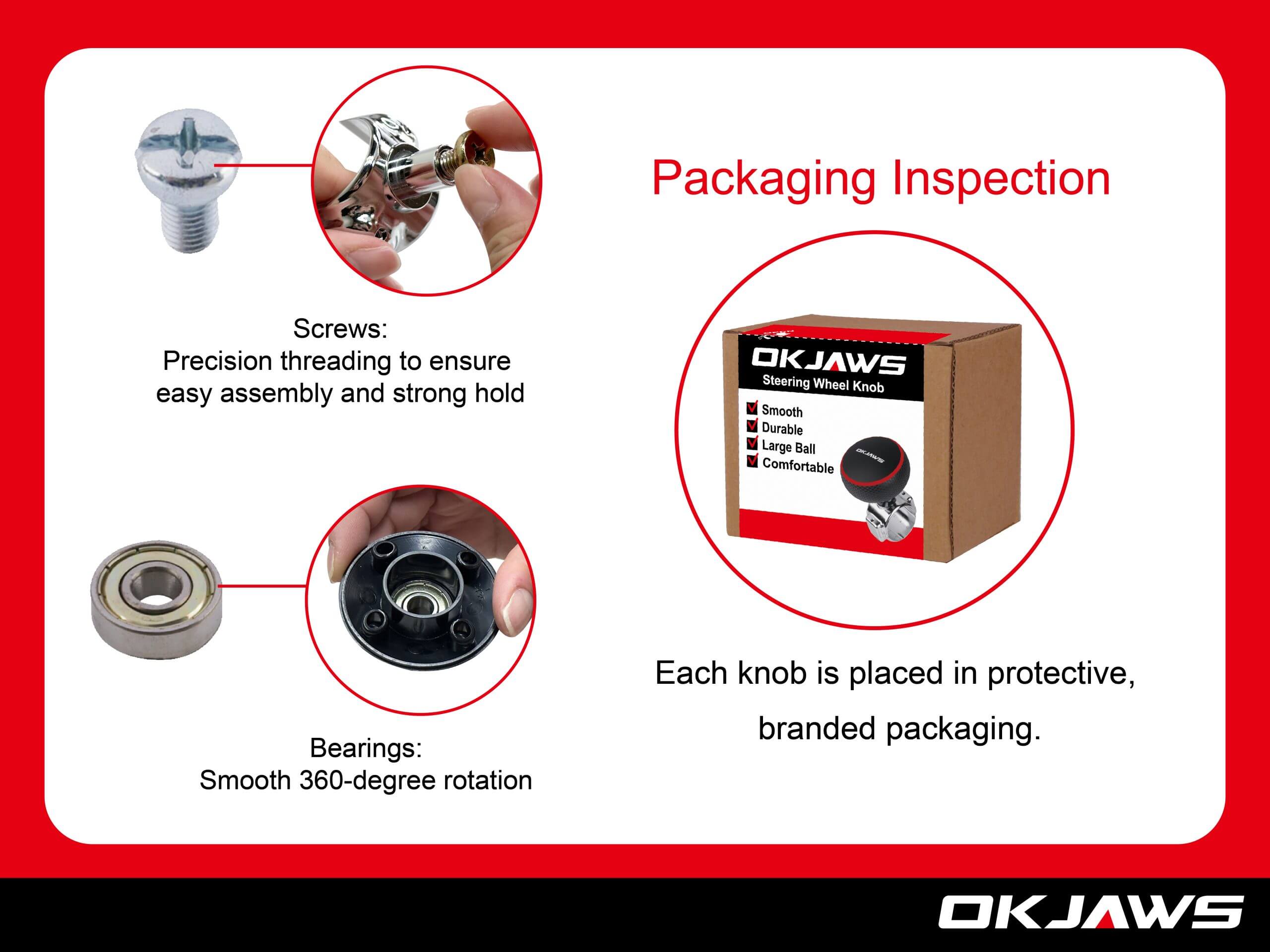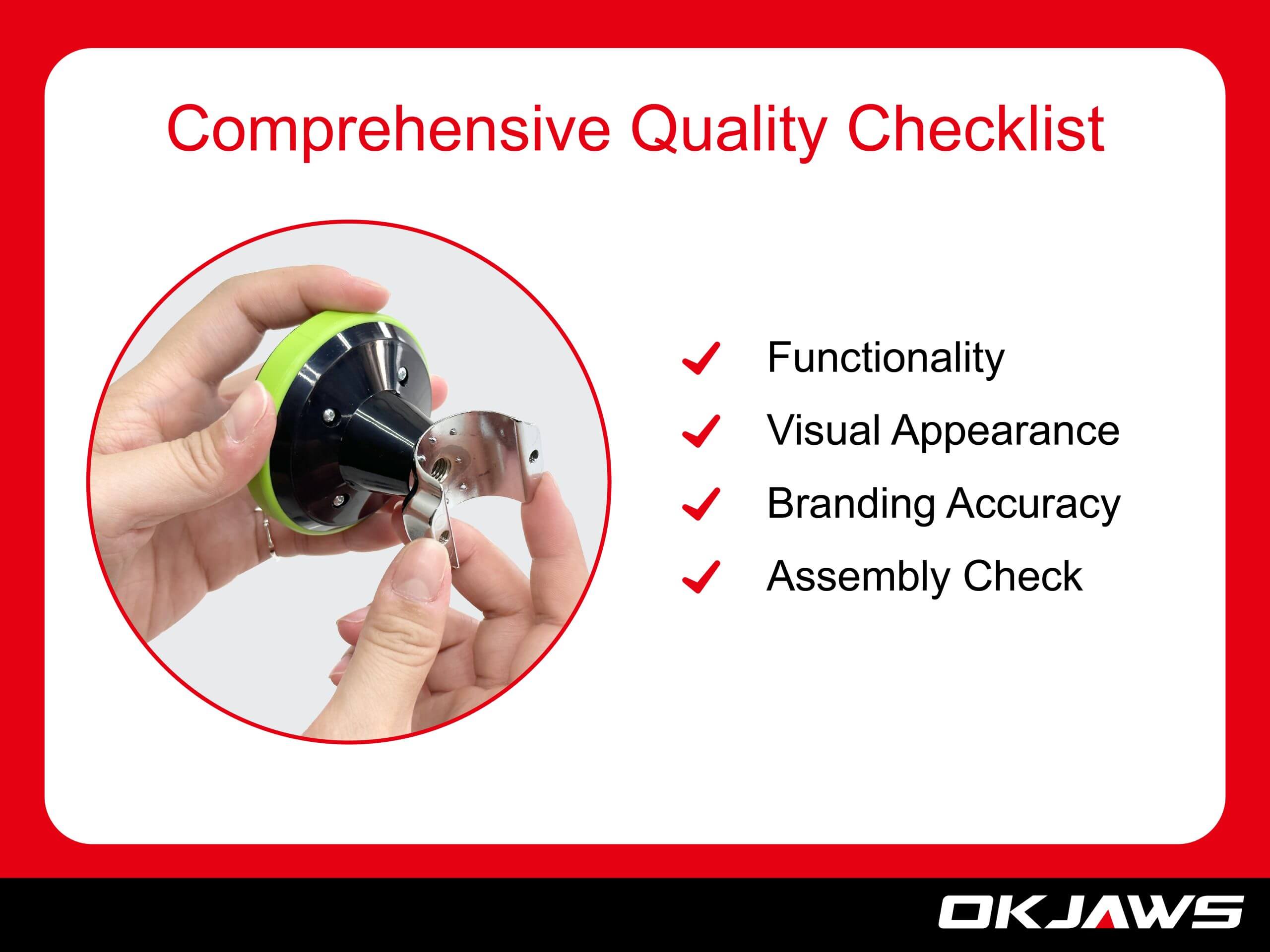| Production Stage | Quality Control (QC) Focus | Key QC Steps |
| 1. Injection Molding | Foundation of product structure |
– Use high-grade raw materials – Monitor molding conditions (temperature, pressure, timing) – Check shape, surface finish, and internal consistency |
| 2. Component Inspection | Verify parts meet functional and visual standards |
– Bearings: smooth rotation, no noise, wear resistance – Screws/Fasteners: accurate threading, rust-proof, torque -tight – Check color, logo, surface |
| 3. Assembly Process | Ensure structural integrity and proper fit |
– Follow SOPs for torque and placement – Real-time QC: alignment, force application, bearing movement – Test rotation, fit, and silence |
| 4. Function & Performance Testing | Simulate real-world driving conditions |
– Torque & stress testing – Vibration resistance – Check for smooth, silent rotation – Friction testing |
| 5. Final Inspection & Packaging | Guarantee defect-free, customer-ready product |
– Final function and appearance check – Logo alignment and screw tightness – Ensure proper packaging, labeling, and inclusion of accessories |
| 6. Real-Vehicle Testing (Befor Product Launch) | Validate real-world reliability through 1000+ hours of on-road driving |
– Test in city, highway, and rough terrain – Monitor grip comfort, wear resistance, mounting security – Collect feedback from professional drivers |

Table of Contents
Toggle1.Introduction
When it comes to driving comfort and safety, every detail matters—especially something as frequently used as a steering wheel knob. A high-quality knob not only provides better control and comfort during driving, but it also ensures durability under daily use. That’s why at Okjaws, we never compromise when it comes to quality.
From the very first stage of production to the final assembly, every wheel steering knob we manufacture is built to meet our strict internal standards. We implement multiple layers of quality control at each step of the process to ensure that every product we deliver is reliable, functional, and built to last.
Before any steering wheel knob is introduced to the market, it undergoes more than 1,000 hours of real-vehicle testing. This ensures that our products can withstand various driving conditions and provide long-term performance in real-world use. At Okjaws, quality isn’t just a promise—it’s the foundation of everything we do.

2. Step-by-Step Quality Control in Production
a.Injection Molding: The First Step in Precision
The production of a high-quality steering wheel knob begins with precision injection molding. This step lays the foundation for the entire product, and that’s why we treat it with the highest level of control and care.
We start by selecting high-grade raw materials that offer excellent durability, resistance to wear, and a smooth surface finish. These materials are critical to ensuring the longevity and appearance of the final product.
During the injection molding process, our team strictly monitors temperature, pressure, and cycle timing to achieve optimal molding conditions. These parameters are carefully controlled to avoid common molding defects such as warping, bubbles, or weak structural points.
Once molded, every component is subject to an initial round of quality checks. This includes inspection for:
Accurate shape and dimensions
Smooth, uniform surface texture
Material consistency with no internal voids or visible flaws
Only components that meet our strict criteria move forward to the next phase of production. By starting strong with precision molding, we ensure that the core of every knob is built to perform.
b. Component Inspection Before Assembly
Before assembly begins, every individual component is carefully inspected to ensure it meets our strict standards. Even the smallest part plays a vital role in the performance and safety of a knob on a steering wheel, which is why we leave nothing to chance.
Inspection of Key Parts
Our quality control team inspects all critical parts, including:
Bearings – A key part that allows smooth rotation. We check for:
Smooth 360-degree rotation
No noise, grinding, or friction
Resistance to wear after repeated use
Screws and Fasteners – These are tested for:
Precision threading to ensure easy assembly and strong hold
Rust and corrosion resistance (especially important for long-term durability)
Tightness under torque pressure to avoid loosening during driving
Performance and Functionality Checks
Once the parts pass visual and structural inspection, we conduct functional tests on key moving components:
Bearings and rotation mechanisms are tested under simulated driving pressure.
Moving parts are checked for resistance levels, ensuring they feel smooth but firm in the user’s hand.
Locking mechanisms and fasteners are tested for secure engagement and resistance to vibration.
Visual and Finishing Quality
Beyond function, appearance also matters. We make sure every component contributes to a polished final product. Our checks include:
Color Consistency – All visible parts must match the approved color samples, with no discoloration or variation.
Logo and Branding – Logos must be cleanly printed, aligned correctly, and free of smudges or misprints.
Surface Finish – We inspect for scratches, mold lines, and any cosmetic defects. The surface should be smooth and professional, whether it’s glossy, matte, or textured.
By performing these thorough inspections before assembly, we prevent any weak or defective components from reaching the final product stage. This process ensures that every steering wheel control knob we produce is built on a foundation of quality parts—ready for final assembly with confidence.
c. Assembly Process: Attention to Every Detail
Once all components have passed inspection, they move on to the assembly stage—where precision, consistency, and human expertise come together to create a reliable finished product. At Okjaws, we treat this step with the same seriousness as every other stage, because the final assembly directly affects both the performance and the user experience of our steering wheel knobs.
Trained Workers and Strict SOPs
Our assembly team consists of skilled and experienced workers who follow standard operating procedures (SOPs) for every knob model. These SOPs detail every action in the assembly process, from the tightening torque for each screw to the specific method of aligning bearings and based. This ensures:
Consistent build quality across all units
Safe and secure fitting of all components
Reduced risk of assembly errors or variation
Each workstation is equipped with specialized tools, jigs, and guides to aid precision and reduce human error.
Real-Time Quality Checks
Throughout the assembly process, real-time quality control (QC) checks are in place at key checkpoints. Inspectors monitor:
Alignment of internal parts
Correct application of force and positioning
Bearing fitment and free movement
Any item that does not meet our standards is immediately removed from the line for rework or rejection—defects are never passed down the line.
Final Functional Testing at Assembly Line
Before moving to final inspection and packaging, every assembled steering wheel knob undergoes:
Rotation Testing – Ensuring the knob rotates smoothly in all directions with no resistance or wobble.
Fit Check – Ensuring the knob mounts correctly on different steering wheel types as per design.
Noise Testing – Confirming silent operation without any rattles, squeaks, or grinding sounds.
By combining manual precision, real-time monitoring, and function testing, we make sure every steering wheel spinner leaving our assembly line is flawless in both construction and performance.
d. Function Testing and Performance Validation
After assembly, each steering knob is put through a series of function and performance tests to ensure it performs reliably under real-world conditions. This stage is crucial for identifying any hidden defects that could affect user safety or product lifespan.
Torque and Stress Resistance Tests
We simulate the forces the knob will experience during daily driving. Using specialized equipment, we perform:
Torque testing to ensure the knob can withstand strong turning forces without loosening or breaking.
Stress testing to evaluate the knob’s ability to handle sudden pressure and long-term repeated use.
Vibration simulation to replicate real-road conditions and ensure the product remains securely fastened and functional.
These tests help us verify the structural integrity of the knob under both normal and extreme usage.
Smoothness of Rotation
A high-quality steering wheel knob must offer smooth, fluid rotation. We check:
360-degree movement for consistency, with no hesitation or uneven resistance.
Bearing performance, ensuring they roll freely and do not catch or stick during use.
Any knob that doesn’t meet our smoothness standard is flagged and re-checked or rejected.
Noise Check: Silent Performance
Unwanted sounds can be a sign of friction, misalignment, or material flaws. That’s why we conduct:
Auditory testing in a quiet environment to detect any rattling, clicking, or grinding sounds.
Friction checks to confirm there is no excess resistance or irregular contact between components.
Only knobs that operate silently and smoothly pass this stage and move on to final inspection and packaging.
e. Final Inspection Before Packaging
Before a steering wheel knob is approved for shipment, it must pass a final comprehensive inspection—our last layer of quality assurance. This stage ensures that only products that meet our full list of quality requirements reach the customer.
Comprehensive Quality Checklist
Each unit is carefully examined by trained inspectors using a standardized checklist. This final inspection includes:
Functionality: Double-checking rotation, stability, and overall performance.
Visual Appearance: Inspecting for scratches, dents, color inconsistencies, or cosmetic flaws.
Branding Accuracy: Ensuring the logo is printed correctly, aligned properly, and meets brand guidelines.
Assembly Check: Verifying tightness of all screws, proper alignment of components, and correct fit.
Packaging Inspection
Packaging is more than just presentation—it protects the product during transit. We make sure:
Each knob is placed in protective, branded packaging.
All accessories and manuals (if applicable) are included.
Barcodes, labels, and batch numbers are correct and scannable.
Cartons are sealed securely and meet shipping standards.
Only products that are 100% defect-free in both function and appearance are approved for shipment. Any unit that does not meet our strict criteria is immediately removed from the batch for rework or disposal.
3. Real-Vehicle Testing: 1000+ Hours of Road Simulation
At Okjaws, we believe that true quality can only be proven on the road. That’s why every new steering wheel knob model undergoes over 1,000 hours of real-vehicle testing before it is approved for market release.
Extensive On-Road Testing
We don’t rely on lab simulations alone. Each product is installed in actual vehicles and tested by professional drivers who spend long hours driving under different conditions. This includes:
Urban stop-and-go traffic
Highway cruising
Rural and mountain roads
These real-world driving scenarios allow us to observe how the knob performs during long-term, repetitive use and under different steering styles and forces.
What We Monitor During Testing
During the 1,000+ hours of road simulation, our team monitors:
Rotation smoothness and grip comfort during extended use
Wear and tear on materials from frequent handling
Structural integrity under repeated torque and vibration
Driver feedback on comfort, usability, and any functional issues
We also evaluate the knob’s ability to stay securely mounted and perform reliably in all steering situations, including tight turns and emergency maneuvers.
Proven Performance You Can Trust
By the time a steering wheel knob reaches production and shipment, it has already been put through the kind of demanding conditions most drivers will never experience. This real-vehicle testing process ensures unmatched reliability, comfort, and long-lasting performance—so our customers can drive with confidence every day.

4. Our Quality Promise to Consumers
At Okjaws, quality isn’t just a process—it’s a promise we stand behind in every product we make. From the initial design and molding to the final inspection and real-world testing, every steering wheel knob is crafted with precision, care, and commitment to excellence.(contact us)
We are dedicated to delivering only products that meet the highest standards of safety, reliability, and performance. That’s why every steering wheel knob that reaches our customers has passed multiple layers of quality control—including over 1,000 hours of real-vehicle testing.
When you choose an Okjaws steering wheel knob, you’re not just getting a driving accessory—you’re choosing a product that’s been proven on the road, built to last, and backed by a brand that cares about every detail.
Your trust drives us to do better, and your satisfaction is the reason we never stop improving.
You May Also Want To Know
How Okjaws Ensures Long-Lasting Logo Branding with Pad Printing
Choosing the Best Steering Knob Base for Safety and Durability
Your Guide to Steering Knob Best Practices